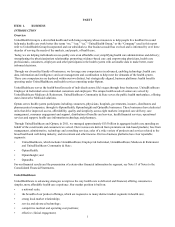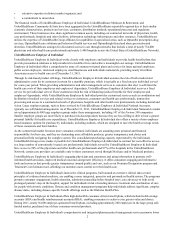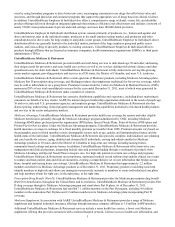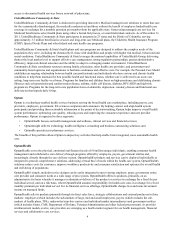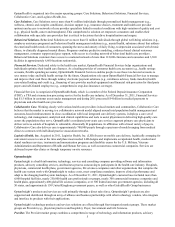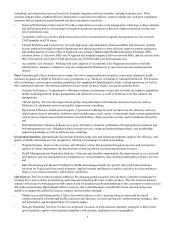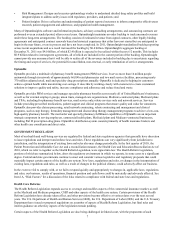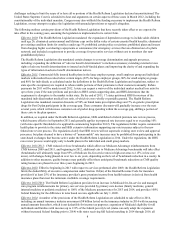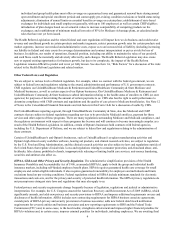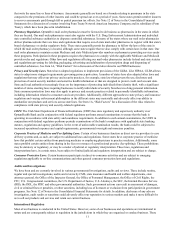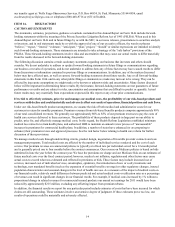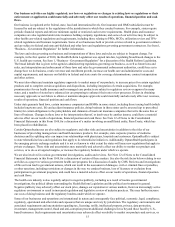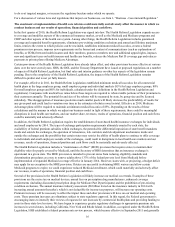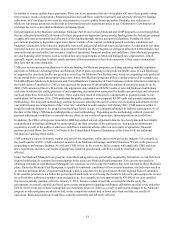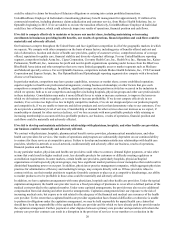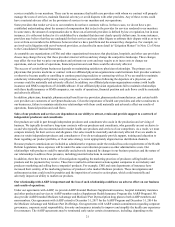United Healthcare 2011 Annual Report Download - page 13
Download and view the complete annual report
Please find page 13 of the 2011 United Healthcare annual report below. You can navigate through the pages in the report by either clicking on the pages listed below, or by using the keyword search tool below to find specific information within the annual report.11
that write the same line or lines of business. Assessments generally are based on a formula relating to premiums in the state
compared to the premiums of other insurers and could be spread out over a period of years. Some states permit member insurers
to recover assessments paid through full or partial premium tax offsets. See Note 12 of Notes to the Consolidated Financial
Statements for a discussion of a matter involving Penn Treaty Network American Insurance Company and its subsidiary (Penn
Treaty), which have been placed in rehabilitation.
Pharmacy Regulation. OptumRx's mail order pharmacies must be licensed to do business as pharmacies in the states in which
they are located. Our mail order pharmacies must also register with the U.S. Drug Enforcement Administration and individual
state controlled substance authorities to dispense controlled substances. In many of the states where our mail order pharmacies
deliver pharmaceuticals there are laws and regulations that require out-of-state mail order pharmacies to register with that state's
board of pharmacy or similar regulatory body. These states generally permit the pharmacy to follow the laws of the state in
which the mail order pharmacy is located, although some states require that we also comply with certain laws in that state. Our
mail order pharmacies maintain certain Medicare and state Medicaid provider numbers as pharmacies providing services under
these programs. Participation in these programs requires the pharmacies to comply with the applicable Medicare and Medicaid
provider rules and regulations. Other laws and regulations affecting our mail order pharmacies include federal and state statutes
and regulations governing the labeling, packaging, advertising and adulteration of prescription drugs and dispensing of
controlled substances. See Item 1A, “Risk Factors” for a discussion of the risks related to our PBM businesses.
Privacy and Security Laws. States have adopted regulations to implement provisions of the GLBA. Like HIPAA, GLBA allows
states to adopt more stringent requirements governing privacy protection. A number of states have also adopted other laws and
regulations that may affect our privacy and security practices, for example, state laws that govern the use, disclosure and
protection of social security numbers and sensitive health information or that are designed to protect credit card account data.
State and local authorities increasingly focus on the importance of protecting individuals from identity theft, with a significant
number of states enacting laws requiring businesses to notify individuals of security breaches involving personal information.
State consumer protection laws may also apply to privacy and security practices related to personally identifiable information,
including information related to consumers and care providers. Additionally, different approaches to state privacy and insurance
regulation and varying enforcement philosophies in the different states may materially and adversely affect our ability to
standardize our products and services across state lines. See Item 1A, “Risk Factors” for a discussion of the risks related to
compliance with state privacy and security-related regulations.
UDFI. The Utah State Department of Financial Institutions (UDFI) has state regulatory and supervisory authority over
OptumHealth Bank and in conjunction with federal regulators performs annual examinations to ensure that the bank is
operating in accordance with state safety and soundness requirements. In addition to such annual examinations, the UDFI in
conjunction with federal regulators performs periodic examinations of the bank's compliance with applicable state banking
statutes, regulations and agency guidelines. In the event of unfavorable examination results, the bank could be subjected to
increased operational expenses and capital requirements, governmental oversight and monetary penalties.
Corporate Practice of Medicine and Fee-Splitting Laws. Certain of our businesses function as direct service providers to care
delivery systems and, as such, are subject to additional laws and regulations. Some states have corporate practice of medicine
laws that prohibit certain entities from practicing medicine or employing physicians to practice medicine. Additionally, some
states prohibit certain entities from sharing in the fees or revenues of a professional practice (fee-splitting). These prohibitions
may be statutory or regulatory, or may be a matter of judicial or regulatory interpretation. These laws, regulations and
interpretations have, in certain states, been subject to limited judicial and regulatory interpretation and are subject to change.
Consumer Protection Laws. Certain businesses participate in direct-to-consumer activities and are subject to emerging
regulations applicable to on-line communications and other general consumer protection laws and regulations.
Audits and Investigations
We have been and are currently involved in various governmental investigations, audits and reviews. These include routine,
regular and special investigations, audits and reviews by CMS, state insurance and health and welfare departments, state
attorneys general, the Office of the Inspector General, the Office of Personnel Management, the Office of Civil Rights, the
FTC, U.S. Congressional committees, the U.S. Department of Justice, U.S. Attorneys, the SEC, the Internal Revenue Service
(IRS), the DOL, the FDIC and other governmental authorities. Such government actions can result in assessment of damages,
civil or criminal fines or penalties, or other sanctions, including loss of licensure or exclusion from participation in government
programs. See Note 12 of Notes to the Consolidated Financial Statements for details. In addition, disclosure of any adverse
investigation, audit results or sanctions could adversely affect our reputation in various markets and make it more difficult for
us to sell our products and services and retain our current business.
International Regulation
Most of our business is conducted in the United States. However, some of our businesses and operations are international in
nature and are consequently subject to regulation in the jurisdictions in which they are organized or conduct business. These


